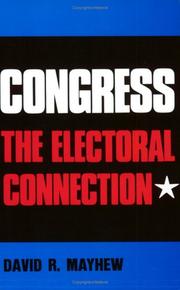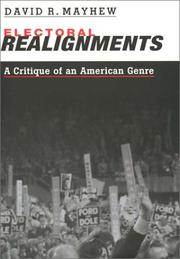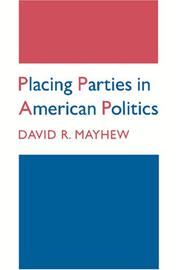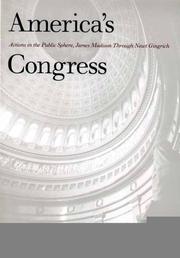| Listing 1 - 10 of 27 | << page >> |
Sort by
|

ISBN: 0300018096 0300017774 9780300017779 Year: 1974 Volume: 26 Publisher: New Haven, Conn. Yale University Press
Abstract | Keywords | Export | Availability | Bookmark
 Loading...
Loading...Choose an application
- Reference Manager
- EndNote
- RefWorks (Direct export to RefWorks)
Public law. Constitutional law --- Political sociology --- United States --- United States. --- Elections. --- 328 <73> --- #SBIB:324H73 --- #SBIB:328H31 --- Parlement. Volksvertegenwoordiging. Regering en parlement--Verenigde Staten van Amerika. VSA. USA --- Politieke verandering: oppositie en minderheid, protest, politiek geweld --- Instellingen en beleid: VSA / USA --- United States. Congress --- -United States. Congress --- Elections --- 328 <73> Parlement. Volksvertegenwoordiging. Regering en parlement--Verenigde Staten van Amerika. VSA. USA --- United States of America

ISBN: 0300093365 9780300093360 Year: 2002 Volume: *3 Publisher: New Haven London Yale University Press
Abstract | Keywords | Export | Availability | Bookmark
 Loading...
Loading...Choose an application
- Reference Manager
- EndNote
- RefWorks (Direct export to RefWorks)
Political parties --- Elections --- Party affiliation --- History --- United States

ISBN: 1400854520 0691610568 0691022496 069107707X 9781400854523 9780691610566 9780691077079 9780691022499 Year: 2014 Publisher: Princeton, NJ
Abstract | Keywords | Export | Availability | Bookmark
 Loading...
Loading...Choose an application
- Reference Manager
- EndNote
- RefWorks (Direct export to RefWorks)
This work on the structure of American parties combines the breadth that has been characteristic of voter analyses and the richness found in case studies of local party organizations.Originally published in 1986.The Princeton Legacy Library uses the latest print-on-demand technology to again make available previously out-of-print books from the distinguished backlist of Princeton University Press. These editions preserve the original texts of these important books while presenting them in durable paperback and hardcover editions. The goal of the Princeton Legacy Library is to vastly increase access to the rich scholarly heritage found in the thousands of books published by Princeton University Press since its founding in 1905.

ISBN: 1281722294 9786611722296 0300130031 9780300130034 9780300093360 0300093365 9781281722294 6611722297 Year: 2002 Publisher: New Haven, CT Yale University Press
Abstract | Keywords | Export | Availability | Bookmark
 Loading...
Loading...Choose an application
- Reference Manager
- EndNote
- RefWorks (Direct export to RefWorks)
The study of electoral realignments is one of the most influential and intellectually stimulating enterprises undertaken by American political scientists. Realignment theory has been seen as a science able to predict changes, and generations of students, journalists, pundits, and political scientists have been trained to be on the lookout for "signs" of new electoral realignments. Now a major political scientist argues that the essential claims of realignment theory are wrong-that American elections, parties, and policymaking are not (and never were) reconfigured according to the realignment calendar. David Mayhew examines fifteen key empirical claims of realignment theory in detail and shows us why each in turn does not hold up under scrutiny. It is time, he insists, to open the field to new ideas. We might, for example, adopt a more nominalistic, skeptical way of thinking about American elections that highlights contingency, short-term election strategies, and valence issues. Or we might examine such broad topics as bellicosity in early American history, or racial questions in much of our electoral history. But we must move on from an old orthodoxy and failed model of illumination.

ISBN: 1281722235 9786611722234 0300130023 9780300130027 9780300080490 0300080492 9781281722232 6611722238 Year: 2000 Publisher: New Haven : Yale University Press,
Abstract | Keywords | Export | Availability | Bookmark
 Loading...
Loading...Choose an application
- Reference Manager
- EndNote
- RefWorks (Direct export to RefWorks)
To understand American politics and government, we need to recognize not only that members of Congress are agents of societal interests and preferences but also that they act with a certain degree of autonomy and consequence in the country's public sphere. In this illuminating book, a distinguished political scientist examines actions performed by members of Congress throughout American history, assessing their patterns and importance and their role in the American system of separation of powers. David R. Mayhew examines standard history books on the United States and identifies more than two thousand actions by individual members of the House and Senate that are significant enough to be mentioned. Mayhew offers insights into a wide range of matters, from the nature of congressional opposition to presidents and the surprising frequency of foreign policy actions to the timing of notable activity within congressional careers (and the way that congressional term limits might affect these performances). His book sheds new light on the contributions to U.S. history made by members of Congress.
Legislators --- Lawmakers --- Legislatures, Members of --- Members of legislatures --- Members of parliaments --- Parliaments, Members of --- Statesmen --- History. --- United States.
Book
ISBN: 0300151764 9786612353208 1282353209 1282089617 9786612089619 9780300151763 9781282089617 9780300137620 0300137621 9781282353206 Year: 2008 Publisher: New Haven
Abstract | Keywords | Export | Availability | Bookmark
 Loading...
Loading...Choose an application
- Reference Manager
- EndNote
- RefWorks (Direct export to RefWorks)
In this wide-ranging new volume, one of our most important and perceptive scholars of the workings of the American government investigates political parties, politicians, elections, and policymaking to discover why public policy emerges in the shape that it does. David R. Mayhew looks at two centuries of policy making-from the Civil War and Reconstruction era through the Progressive era, the New Deal, the Great Society, the Reagan years, and the aspirations of the Clinton and Bush administrations-and offers his original insights on the ever-evolving American policy experience. These fourteen essays were written over the past three decades and collectively showcase Mayhew's skepticism of the usefulness of political parties as an analytic window into American politics. These writings, which include a new introductory essay, probe beneath the parties to the essentials of the U.S. constitutional system and the impulses and idiosyncrasies of history.
Political planning --- Political parties --- Policy sciences. --- Policy-making --- Policymaking --- Public policy management --- United States --- Politics and government. --- Government --- History, Political --- Policy sciences --- Politics and government
Book
ISBN: 0300227949 9780300227949 9780300215700 0300215703 Year: 2017 Publisher: New Haven
Abstract | Keywords | Export | Availability | Bookmark
 Loading...
Loading...Choose an application
- Reference Manager
- EndNote
- RefWorks (Direct export to RefWorks)
What kind of job has America's routinely disparaged legislative body actually done? In The Imprint of Congress, the distinguished congressional scholar David R. Mayhew gives us an insightful historical analysis of the U.S. Congress's performance from the late eighteenth century to today, exploring what its lasting imprint has been on American politics and society. Mayhew suggests that Congress has balanced the presidency in a surprising variety of ways, and in doing so, it has contributed to the legitimacy of a governing system faced by an often fractious public.
Legislators --- Lawmakers --- Legislatures, Members of --- Members of legislatures --- Members of parliaments --- Parliaments, Members of --- Statesmen --- History. --- United States --- Politics and government. --- Government --- History, Political --- United States.
Book
Year: 1975 Publisher: New haven: Yale university press,
Abstract | Keywords | Export | Availability | Bookmark
 Loading...
Loading...Choose an application
- Reference Manager
- EndNote
- RefWorks (Direct export to RefWorks)
Book
Year: 1966 Publisher: Cambridge (Mass.): Harvard university press,
Abstract | Keywords | Export | Availability | Bookmark
 Loading...
Loading...Choose an application
- Reference Manager
- EndNote
- RefWorks (Direct export to RefWorks)
Book
Year: 1966 Publisher: Cambridge : Harvard University Press,
Abstract | Keywords | Export | Availability | Bookmark
 Loading...
Loading...Choose an application
- Reference Manager
- EndNote
- RefWorks (Direct export to RefWorks)
Legislators --- Party discipline --- Parlementaires --- Discipline de parti --- United States --- Etats-Unis --- Politics and government --- Politique et gouvernement
| Listing 1 - 10 of 27 | << page >> |
Sort by
|

 Search
Search Feedback
Feedback About UniCat
About UniCat  Help
Help News
News